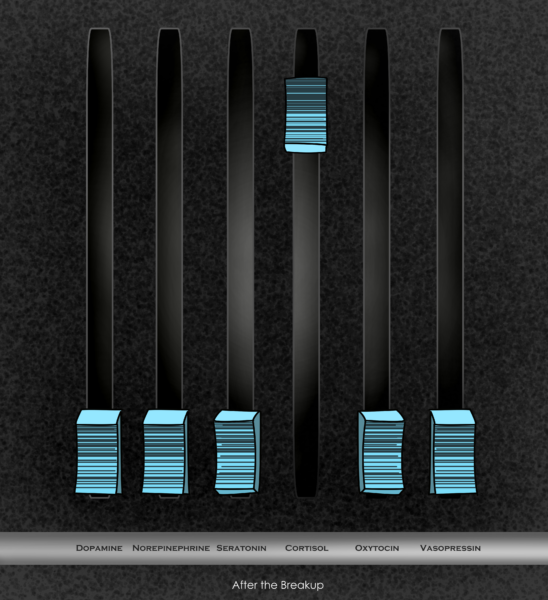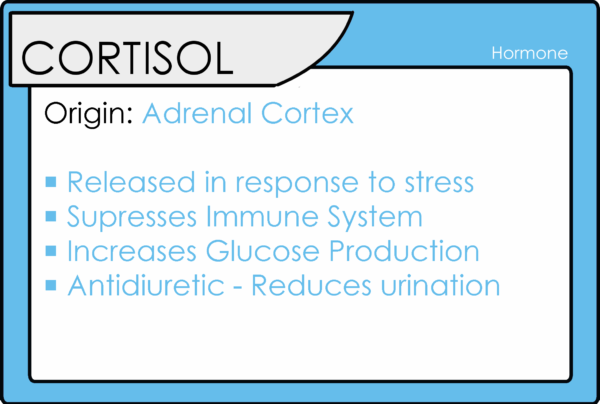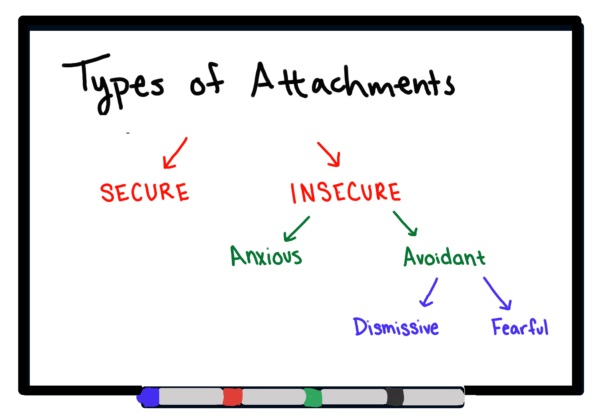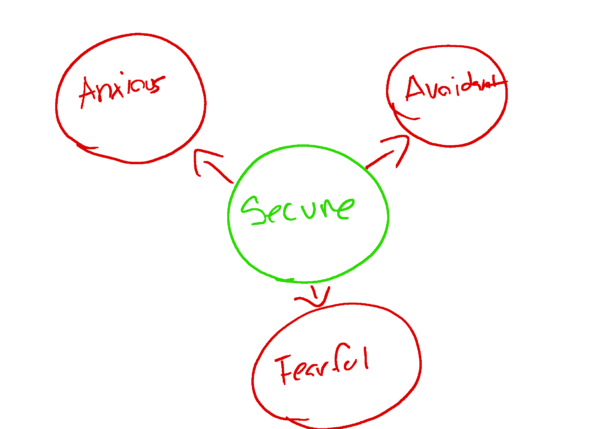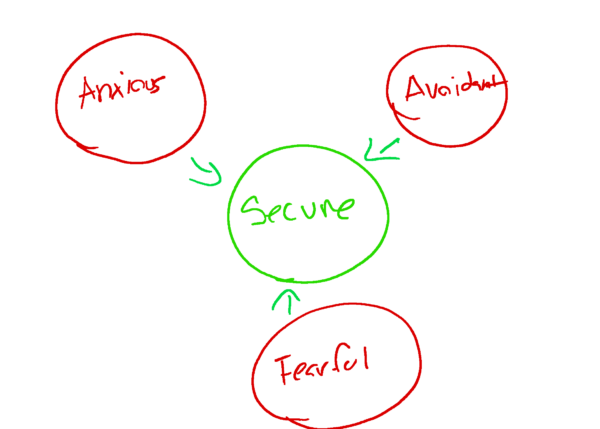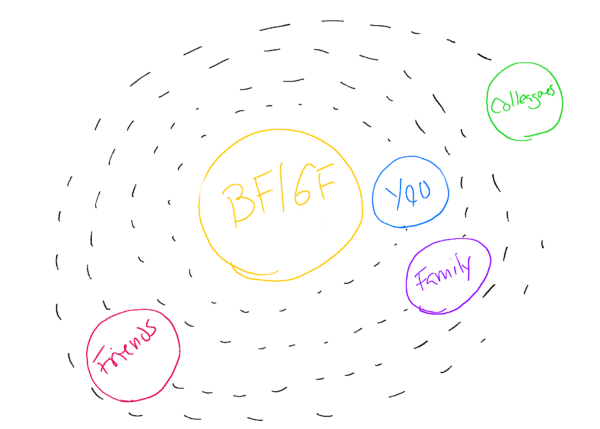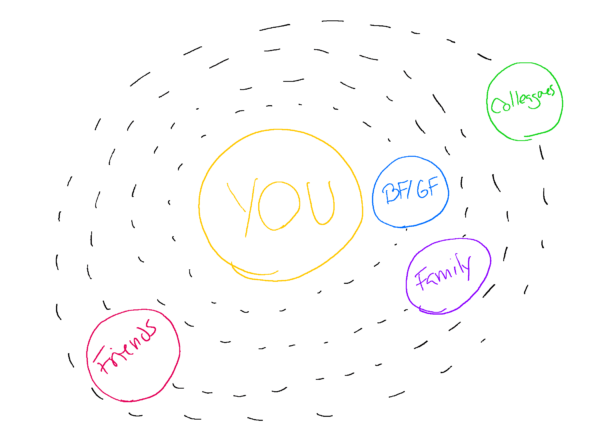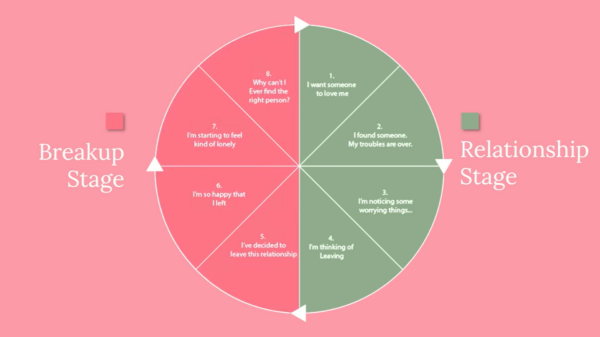Looking at why breakups change you is always an interesting challenge.
Some people will argue that they lead you to question who you are. Others will point to brain chemistry or the physical changes happening in your body. None of those are the wrong answer.
Here’s my take,
Breakups are profound emotional experiences that often prompt deep introspection and self-reflection. When a relationship ends, it disrupts the intertwined identities and shared routines that individuals have built with their partners. This disruption can lead to a re-evaluation of one’s self-concept, values, and life goals. The emotional turmoil, combined with the need to adapt to a new reality, can challenge previously held beliefs and behaviors. As individuals navigate the healing process, they often seek to find meaning in the experience, leading to personal growth, new insights, and changes in behavior and outlook. In essence, the transformative nature of breakups stems from the interplay of emotional processing, adaptive mechanisms, and the quest for self-understanding.
And today I’d like to go through a huge deep dive on every relevant way I can think of to show you how they can change you. Things like,
- Showing you how they literally change your brain chemistry
- The physical changes they have on your body
- Looking at what happens to your attachment style post breakup
- The issue with losing your identity in a relationship
- How breakups impact men vs women
- Why you are more prone to cognitive dissonance after a breakup
Let’s begin!

What Are Your Chances of Getting Your Ex Boyfriend Back?
Take the quizThey Literally Change Your Brain Chemistry
Let’s examine how breakups can significantly alter your brain chemistry. The graphic presented here illustrates the neurochemical changes in our brains during a breakup.
Observe how levels of:
- Dopamine
- Norepinephrine
- Serotonin
- Oxytocin
- Vasopressin
Are all decreased, while cortisol increases.
Cortisol, in particular, is often the focal point during a breakup.
It’s the stress hormone, leading to heightened anxiety and stress.
I’ve previously discussed on this website how prolonged elevation of cortisol, due to constant aggravation, can extend its normalization time. Instead of the usual three to four hours to return to baseline levels, it can remain elevated for up to six months.
This prolonged elevation is a primary neurochemical reason I highlight to explain the prolonged struggle many face post-breakup. Even after six months, some visitors to this site express difficulty moving on.
Why?
Cortisol is a key factor.
However, it’s essential to note the decrease in other neurochemicals like dopamine, norepinephrine, serotonin, oxytocin, and vasopressin. These significant shifts in neurochemistry can explain why individuals post-breakup feel akin to undergoing withdrawal.
Let’s actually the graphic above to one representing the honeymoon phase.
Do you see how wildly different they are?
In the honeymoon phase at the beginning of a relationship, these chemicals are elevated, but post-breakup, they’re reduced.
This imbalance leaves the body craving a way to regain equilibrium.

What Are Your Chances of Getting Your Ex Boyfriend Back?
Take the quizBreakups, therefore, not only alter brain chemistry temporarily but can also induce various physical changes in the body.
They Can Cause All Kinds Of Physical Changes With Your Body
I’m actually going to quote from another article on this website, The Anatomy of A Breakup, with regards to what physical changes you experience during a breakup.
Lack of Motivation
Well, since Dopamine is your personal supply of motivation and it is now in short supply, you are now not only short on Dopamine but also on motivation.
Fatigue
Dopamine also helps regulate sleep. So, you guessed it. You are about to have yourself some sleepless nights staring at the ceiling wondering what caused your relationship’s untimely end.
Inability To Concentrate
Norepinephrine, also known as Adrenaline, can make your heart race and butterflies reside in your stomach when you are first falling in love. Adrenaline is incredibly useful and can make you more mentally aware and provide you with lots of energy. However, when the level of Adrenaline drops the ability to focus drops as well. Leaving you feeling like you’ve kind of lost direction.
Sleep Problems
Have you been having some trouble getting substantial sleep? I bet you thought it was just because you missed your Ex. Well partially maybe, but the drop of Dopamine levels can be thanked for your inability to sleep as well.
Loss Of Appetite
Serotonin is responsible for regulating appetite. If you find yourself eating simply to comfort yourself and not because you are actually hungry, you are probably just feeling the effects of a level of Serotonin you aren’t used to since you’ve been in a relationship up until the point.
Lack of Libido
This one varies in most people. Although they still are experiencing a low Serotonin level, they may find motivation elsewhere, making their Ex jealous. However, sleeping with someone solely to make your Ex jealous or think you’ve moved on isn’t necessarily the healthiest thing to do. You’ll wind up either regretting or realizing how pointless that way of thinking is.
Suppressed Immune System
This one is the most important, I think. As soon as I realize that I am feeling the effects of a Breakup, I start being super-diligent in taking my vitamins and taking care of myself. Trust me, getting sick AND dealing with heartbreak at the same time is not an easy course.
Looking At How Attachment Styles Are Impacted In Relationships:
Now, let’s explore how attachment styles influence relationships. If you’re unfamiliar with attachment styles, I recommend familiarizing yourself with the concept.
Understanding these styles can offer insights into behaviors observed during relationships and breakups.
Generally, there are four primary attachment styles:
- Secure
- Anxious
- Avoidant
- Fearful.
These styles originate in childhood and can evolve based on life experiences. While researching for this discussion, I came across an article from a New York City therapy center discussing the link between trauma and attachment styles.
They emphasized that trauma can significantly influence one’s attachment style in adulthood causing it to shift.
This is crucial because I’ve observed that people’s attachment styles can shift during a relationship and become even more pronounced after a breakup.

What Are Your Chances of Getting Your Ex Boyfriend Back?
Take the quizFor instance, consider someone with a secure attachment style entering a relationship with an avoidant partner. A person with a secure style typically has a balanced approach to relationships and excels at setting boundaries. However, interactions in relationships can be likened to a cocktail, unpredictable based on the mix of attachment styles.
In such a relationship, there’s often a tug-of-war: the secure style tries to stabilize the dynamics, while the avoidant style resists.
Over time, the avoidant behavior of the partner can heighten the secure individual’s anxieties, pushing them towards an anxious attachment style. From my interactions with clients, I’ve noticed that many who believed they had a secure style found it shifting due to the relationship’s challenges.
The trauma of the breakup and the continuous avoidance by their partner can amplify their anxious tendencies, altering their primary attachment style and influencing other aspects of their daily life.
We often hear about individuals who endure tumultuous divorces, and these experiences profoundly affect their subsequent relationships due to fears of betrayal, among other concerns.
This phenomenon is rooted in the psychology of attachment styles.
However, it’s worth noting that while we’ve discussed the negative shifts in attachment styles, they can also evolve positively.
I recently read an insightful article from Psychology Today that delved into modifying one’s attachment style.
A notable quote from the article states,
“Although most people don’t change their attachment style, you can alter yours to be more or less secure depending on experiences and conscious effort. To become more secure, consider therapy and seek relationships with those capable of forming secure attachments.”
For instance, if you have an anxious attachment style, being in a committed relationship with someone securely attached can enhance your stability and security.
This aligns with a concept I frequently discuss on this website: the “secure attachment gravity.” If you maintain a secure attachment style unaffected by an insecure partner, you can positively influence them, guiding them towards understanding and experiencing a secure relationship.
In essence, while breakups can be transformative in various ways, one significant change can be the evolution of your attachment style.
If You Aren’t Careful You Can Lose Your Identity In A Relationship
Let’s delve into the topic of codependency.
Without vigilance, it’s easy to lose one’s identity within a relationship. Building on the concept of attachment styles, I’ve observed many clients becoming deeply enmeshed in codependent relationships, to the point where their identities become inseparable from their partners.
A metaphor I often use to illustrate this is the solar system.
Imagine yourself as a planet.
You can either be the central body, with other entities like moons orbiting around you, or you can be a planet orbiting around someone else’s center, such as an ex-partner.
From my experience, post-breakup, many clients find themselves in the latter scenario, with their well-being and self-worth hinging on their ex’s decisions and feelings.

What Are Your Chances of Getting Your Ex Boyfriend Back?
Take the quizThis dynamic is perilous, as it not only makes one susceptible to manipulation but also fosters unhealthy habits.
Such individuals often exhibit insecure attachment behaviors, becoming increasingly anxious and despondent when things don’t align with their desires. Their lives become dictated by their ex’s actions, with any slight from the ex overshadowing their entire day.
The key takeaway is the importance of re-establishing oneself as the central figure in one’s life post-breakup, ensuring that you are at the heart of your own universe.
Now, let’s explore how breakups can affect men and women differently. I’ve come across several research findings that are particularly pertinent to this discussion.
A Breakup Can Change Men And Women In Different Ways
When researching this topic I actually stumbled across a study that revealed that the effects of a breakup on one’s personality can differ based on gender.
It indicated that women who underwent a divorce exhibited increased extroversion and openness, likely stemming from the liberating aftermath of the breakup.
This finding intrigues me, especially in relation to avoidant individuals. If you’re familiar with my content on this website, you might recall a concept I often discuss: the “avoidant death wheel.”
Stage six of this wheel is labeled the “I’m so happy I left” phase, which mirrors the separation elation stage.
I’m curious if the women in the study, who displayed heightened extroversion and openness post-divorce, exhibited avoidant tendencies and were experiencing this separation elation phase.
Conversely, the study also found that divorced men seemed to become less conscientious and more emotionally unstable.
This reminded me of another study from a few years ago that explored gender differences post-breakup.
The research suggested that women typically experience more intense pain immediately after a breakup but recover more comprehensively than men.
I believe this disparity might be because men often avoid seeking external help, choosing to grapple with the issue independently. This approach can lead to a lack of community support and healing resources.
In contrast, while women might feel acute pain initially, this pain propels them to seek improvement and support, facilitating a more complete recovery. Men, however, might retain lingering emotions.
Understanding these gender-based differences in post-breakup reactions and recovery offers valuable insights into the distinct ways breakups shape men and women.
Breakups Make You More Prone To Cognitive Dissonance
Cognitive dissonance is a psychological concept introduced by Leon Festinger in 1957.
It refers to the mental discomfort or tension that arises when an individual holds two or more contradictory beliefs, values, or attitudes simultaneously, or when their behavior conflicts with their beliefs or values.
This discomfort motivates individuals to reduce the inconsistency and restore a sense of internal harmony.
When it comes to breakups specifically cognitive dissonance plays a significant role in the aftermath of a breakup as it influences how individuals process the end of the relationship and how they perceive themselves and their ex-partner.
Here’s how cognitive dissonance relates to changes after a breakup:
- Re-evaluation of the Relationship: After a breakup, there’s often a dissonance between one’s belief in a “happy relationship” and the reality of the breakup. To resolve this, individuals might re-evaluate the relationship, focusing on its negative aspects or downplaying its positive moments to justify the breakup.
- Behavior-Belief Conflict: If someone believes in long-term commitment but ends a relationship, they might experience dissonance. To alleviate this, they might emphasize the reasons that made the breakup necessary, such as incompatibility, differing life goals, or unhealthy dynamics.
- Self-Perception: A breakup can challenge one’s self-concept, especially if they identified strongly as part of a couple. The dissonance between the “single” reality and the “couple” identity might push individuals to redefine themselves, leading to personal growth or change.
- Post-Breakup Decisions: Engaging in behaviors like seeking a rebound relationship or avoiding commitment can create dissonance if they contradict one’s usual values or beliefs. Individuals might rationalize these behaviors as necessary coping mechanisms or temporary phases.
- Idealization of the Ex-Partner: If someone still has feelings for their ex-partner but knows the relationship wasn’t right, they might experience dissonance. To cope, they might either idealize the ex-partner, focusing only on their good qualities, or demonize them, recalling only the negatives.
- Social Expectations: Societal or cultural beliefs about relationships can cause dissonance post-breakup. For instance, if someone believes in “lifelong commitment” but goes through a breakup, they might feel a conflict between societal expectations and their personal reality. This can lead to self-reflection and a re-evaluation of personal beliefs about relationships.
- Growth and Lessons: The desire to learn from the past and avoid repeating mistakes can arise from the dissonance between one’s belief in being a “good partner” and the recognition of flaws or mistakes in the relationship. This introspection can lead to personal growth and change.
